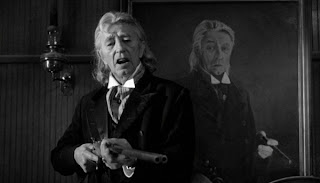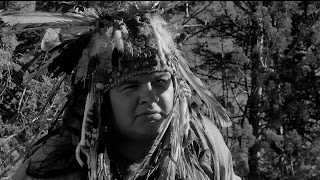I was already familiar with the plot of The Uninvited before I sat down to watch it. My lovely and talented wife co-starred in a local theatrical production of the play, which was based on the same book as the film. With the element of surprise gone, I was free to study the film as if this was my second or third viewing.
The Uninvited opens with Roderick (Ray Milland) and his sister, Pamela (Ruth Hussey), losing control of their dog while trespassing on private property. Being fairly reckless with their terrier, the pair apparently opted to not bring a leash with them and, when the dog saw a squirrel, it was all over; the dog chased the suspiciously slow squirrel into a lovely but empty house, as a piano played in the soundtrack, a la Tom and Jerry. Many people would be embarrassed enough to leave quickly, but not Roderick and Pamela. They decided to give themselves a tour, and they fell in love with the house.
 |
| "Yes, house...I must murder my sister so we can be alone..." |
 |
| How low was the bid? Instead of dollars, they used day-old herring |
 |
| Hint: it involves dramatic running |
The Uninvited stands out from other mid-1940s movies for a few reasons. Most notably, this story uses a ghost haunting as a legitimate plot device. To the best of my knowledge, that makes it the first (at least in Hollywood) drama to not have the haunting be an elaborate ruse. This is a ghost story, plain and simple. Of course, there were not many special effects back then, so we don't see much of the ghost. I was impressed that they showed it at all, even as a barely visible smoky image. That said, The Uninvited is clearly uncomfortable with its subject matter. Every time the film started to take advantage of its creepy mood, the tension was undercut by comic relief or Roderick trying to seduce Stella Meredith. While that may be a product of the times --- how often did Hollywood really try to frighten its audiences in the 40s? --- that still doesn't excuse comic relief that deserves to be accompanied by a wah-wah horn riff.
The acting in The Uninvited is decent, but there are no great performances here. Ray Milland is likable enough in the lead, but his character is too shallow for a quality leading role. Similarly, Ruth Hussey is okay as Milland's sister, but her character has some serious logic lapses --- why didn't she mention the haunting to her brother earlier? --- without adequate explanation. Gail Russell was better as a pleasant, but naive, love interest for Milland, but her role wasn't very deep. Donald Crisp was pretty over-dramatic as Stella's grandfather. Cornelia Otis Skinner gave the most interesting performance in the cast, as the painfully proper (and probably evil) Miss Holloway. I found it interesting that the filmmakers opted to hint that the character was gay; not surprisingly, she is cast as a bit of a villainess.
 |
| Only lesbians keep portraits with such well-defined busts |
This was the first film to be directed by Lewis Allen, and it remains one of his most widely recognized. Personally, I was not impressed with Allen's direction at all. I thought the acting varied between unnecessarily campy (Milland's seasick scene and all the humor) and overly dramatic. Every time he managed to make a scene somewhat tense, he undermined it. It doesn't help that ghost stories do not age particularly well, especially ones that involve little to no outright horror. I thought he did a decent job starting to make the film scary, but he never went that extra step for a satisfying conclusion. Ouija boards and rooms filled with a menacing evil are decent starting points, especially in 1944, but Allen always opted for the least disturbing way out of those scenes.
 |
| N...O...T...S...C...A...R...Y...A...T...A...L...L... |
I think it is telling that The Uninvited is one of the few classic horror movies to not have a recent remake. The premise is fine --- the house is haunted and there is a family secret --- but the way the story is told removes a lot of the drama. This is a ghost mystery, where the main characters try to decode a twenty year-old drama to put the ghosts at rest. That means that there is really no action or villain that can be overcome in a satisfying manner. Instead, the main characters wind up having a lot of exposition in their dialogue to explain what is happening in the film, because it can't be shown. Sure, the acting is decent and the movie looks pretty enough, but the story is lackluster.






































